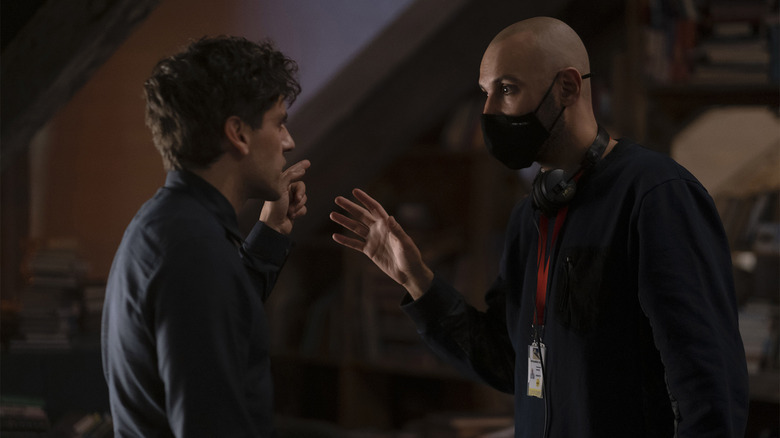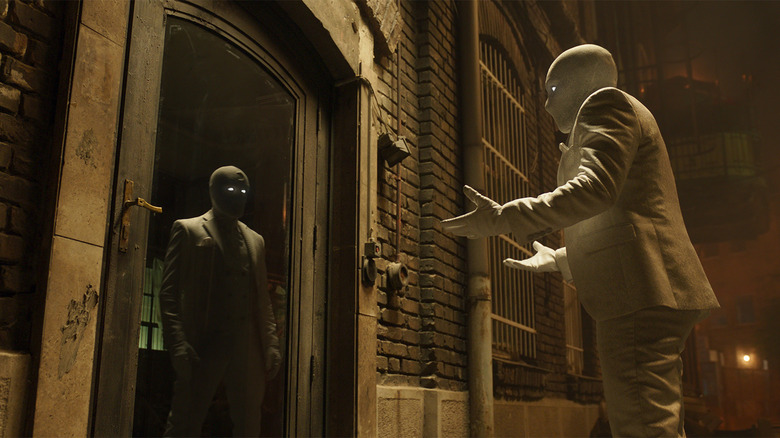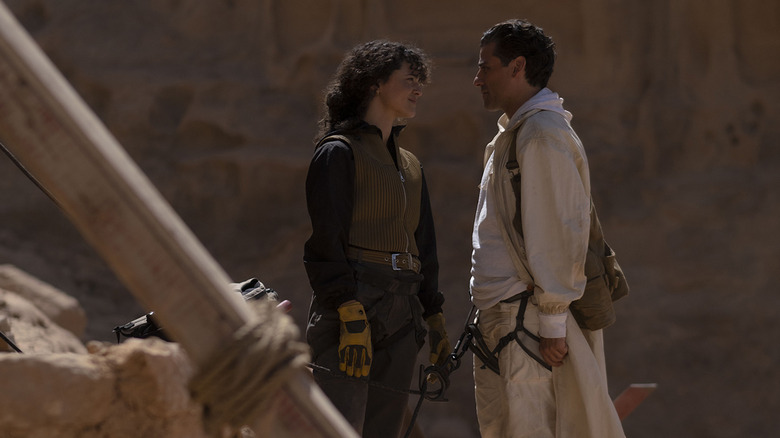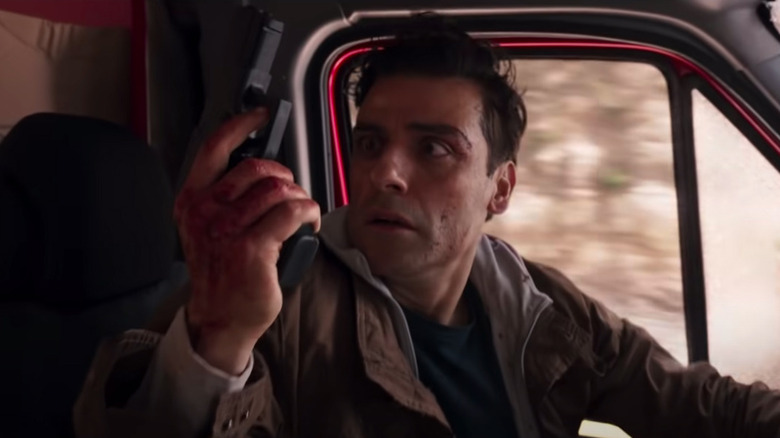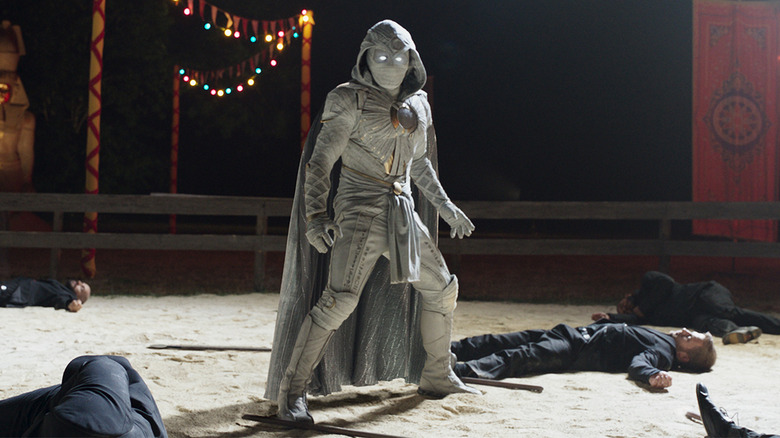Moon Knight Director Mohammed Diab Talks Unpredictable Action, Egyptian Representation & More [Interview]
The first episode of "Moon Knight" is available to stream on Disney+ right now, bringing a unique superhero into the Marvel Cinematic Universe. Oscar Isaac plays Steven Grant, an unassuming, socially awkward museum gift shop employee in London who has his life thrown into upheaval when he realizes that his dissociative identity disorder has gotten him caught up in a plot of mystical intrigue. His alternate personality, known as Marc Spector, has the ability to summon a suit that allows him to harness the power of the Egyptian moon god Khonshu, giving him superhuman abilities and weapons.
With so much Egyptian influence in the show's iconography and globe-trotting adventure, director Mohamed Diab (director of "Clash" and "Amira," pictured in the mask above) was the perfect filmmaker to bring "Moon Knight" to life. Diab directed the first episode of the season (as well as the third episode in the first four installments provided to press in advance of the premiere), and we spoke with him about his cinematic influences, the unique approach to certain action sequences involving the title character, and the importance of respectful representation of international cultures in Hollywood productions.
This interview has been lightly edited for clarity and brevity.
'We are born to do this'
What was it like meeting with Marvel Studios for the first time? Did you have pitches ready for them? Do they present you with projects that they want to make and gauge your interest? How did it work?
Mohamed Diab: I moved [to Los Angeles] three years ago, looking for a story that feels like an extension of my work, but I can share it with bigger audiences. My agents told me, "There's this script, check it out." I checked it out, and I loved it. And I said, "Yes, I want to approach that. I want to ask them if I can pitch for it." So I met with Grant Curtis, our executive producer and the person I owe for making me part of this project. I told him how much I liked it, and I gave him, initially, what my vision was. He told me, "Read all those comic books, come back with a pitch." And that's what I did.
In 12 days, me and Sarah — Sarah Goher is my wife and producer and co-writer — put together this massive 200-page pitch. And we looked at each other at the end, and we told ourselves, "We're going to get the job because we're not just covering everything. We are born to do this." You know? By the way, in three years, I almost didn't pitch for anything. It's very hard for me to connect to something. And guess what? After two years, our pitch is the show.
That's brilliant. Since you and your wife work as a duo in the way that Justin Benson and Aaron Moorhead do, were there ever any differences in the vision that you guys had that you had to work through?
Well, if you are doing six episodes, they have to have the same feel and the same taste, and you have to feel like a unit. So I was hired as the head director and executive producer to oversee that. I had my 200-page pitch when Justin and Aaron were hired to direct those two episodes. I handed them the pitch, and I told them, "This is exactly how I want to see it." And that's it.
The guys were super smart, super collaborative. We definitely talked a lot about how to develop the characters, all of us together. We had those meetings when we talked about developing everything with Ethan [Hawke], Oscar [Isaac], Sarah, and Grant, and the writers. I think that really made the show feel like one voice. I would love to work with those guys again. I consider them family.
'I love grounded cinema. I love Mexican cinema. I love Iranian cinema...'
What are some of your specific cinematic influences for the "Moon Knight" series?
I'm going to give you the pitch that [series co-star] May [Calamawy] says. May always says that we are "Indiana Jones" meets "Fight Club." But visually, I love grounded cinema. I love Mexican cinema. I love Iranian cinema, ironically. That's what shaped my visual style. I have a visual style and it's exactly what I applied here.
What would be some titles or filmmakers from Mexican and Iranian cinema that you might encourage people to seek out, if they like what you did with the "Moon Knight" series?
I'm just going to talk about like modern people, like Asghar Farhadi. I love Asghar Farhadi [director of "A Separation" and "A Hero"]. [Abbas] Kiarostami is like a legend. These are the Iranians. And definitely the trio: [Alejandro Gonzalez] Iñarritu, [Alfonso] Cuarón, and [Guillermo] del Toro. I love those three. For modern cinema, I think they're all legends.
When it comes to the more challenging aspects of getting behind a high profile project like this, was there anything that was particularly daunting about the production for you?
I'm not going to say anything daunting, but I love challenges. I'm someone who directed trauma, and my films are dark. So to direct comedy was a challenge, but I loved it. I feel like my taste is there, because it feels different. It was a big challenge to direct action and try to make it unique. Because you can use the tools and use the help, but you can challenge yourself and do something different. In the past 20 years, I think most people that made good action movies are actually people who directed drama, like Christopher Nolan, Denis Villeneuve, or Sam Mendes. Directing horror, all those genres I never played with. Dealing with DID [dissociative identity disorder] with the utmost respect, the biggest challenge was how to blend all that together and make it feel like one unit, and we're not turning on and off genres. You know what I mean?
For sure.
So it's a director's dream and it's a director's nightmare. Very scared for the outcome. Because every time you make a recipe like this, any film, you don't know how people are going to receive it. So I'm really happy that it worked.
'Our action is unpredictable'
You mentioned the action, and in the first episode especially, we have those sequences where it's Steven Grant's POV. But because he's unaware of what Mark Spector is doing, we don't necessarily see how he deals with those dangerous situations. When you're planning those sequences, do you still have to figure out exactly what happens in those scenes, despite the fact that we don't see what happens?
Absolutely. They were written and then omitted.
That's wild.
By the way, this is my favorite bit in the action of the whole show. How many times did you see big action sequences and then after, "Oh, you know what? I got bored. I know what's going to happen. He's going to win."
Right.
Or you don't care. But small or big, our action is unpredictable. In any moment, there's a blackout. And all of a sudden, what the hell happened? If you missed it, you're not going to understand what's going on. So I always told my action team, "Guys, this is brilliant, and the best thing about it is those moments." And it's not a gimmick. I always love to have something fresh, but it's not a gimmick, because it feels like someone who has DID. Those blackouts and those jumps are sometimes exactly how a lot of people who have DID feel.
'It's very important just to build bridges'
That's very cool. I wanted to mention something else that you talked about recently, which is your concern, and I guess distaste, with how Egypt has been depicted in film and TV. I was curious if there were any movies that you actually felt had done this correctly or done this in a respectful way, that you had appreciated.
I don't want to name specific films negatively or positively. I'm going to actually study that after I finish with you, after I'm done, because I need to think about that. If I have an answer, I'm going to send it to you. What I would tell you is, I feel like Hollywood is taking better steps, hiring from every culture, and finding voices that are trying to be from that culture. It's very important just to build bridges. If you saw me always as a bad guy, or women are submissive, or even the music and everything else about us are dulled for your tastes, you're not going to feel like we connect as easily.
In our show, I'm proud of the music. I'm proud of the songs. The composer [Hesham Nazih] is Egyptian, and we use some old Egyptian songs and some of the new Egyptian rap scene. A lot of people told me, "We Shazam'd them," and, "We felt connected to them, and we love them, even though we don't understand anything." That connects people.
Seeing Layla as a fierce strong woman — which is exactly my mom, my sister and my daughter — not falling into those tropes, it's a very important thing. It's something that really can bring people together. And that's the most important thing.
I don't want to be critical in just like pointing out, "Oh, we did it better than you." All I hear is things are getting better, and I actually feel like Hollywood is taking good steps towards that.
On that same train of thought, are there any other Marvel characters of Middle Eastern origin or influence that you would like to see come together at Marvel Studios, or that you would like to tackle yourself?
I forgot the names, but Marvel already acquired a couple of Middle Eastern characters, if I remember, one of them was from Michigan [Diab is speaking of the new Marvel Comics character known as Amulet]. And I don't want to spoil it, but I'm sure Marvel, even though they keep us in the dark, I have the feeling this is on their mind, not just our culture. Representing everyone is something that they are working on. So I'm sure this is going to come up very soon.
The first episode of "Moon Knight," directed by Mohamed Diab, is available on Disney+ right now.
